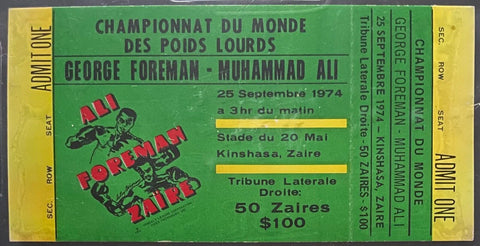This Day in History: Rumble in the Jungle
In the annals of boxing history, few fights stand out as profoundly as the "Rumble in the Jungle." Held on the night of October 30, 1974, in Kinshasa, Zaire (now the Democratic Republic of Congo), this legendary bout between Muhammad Ali and George Foreman wasn't just about two heavyweight champions battling for supremacy. It was a spectacle that transcended sports, culture, and geography, forever altering the landscape of professional boxing. In this blog post, we will delve into the events leading up to this iconic fight, the electrifying night itself, and the lasting impact it had on the world of sports.

The Backstory
The story of the "Rumble in the Jungle" begins with George Foreman's meteoric rise to boxing stardom. Foreman, an imposing and destructive force in the ring, had taken the heavyweight division by storm. He had a perfect record with 40 wins, 37 of which came by way of knockout. Foreman's opponents frequently met their demise within the first few rounds, earning him a fearsome reputation.
Opposite Foreman stood Muhammad Ali, a boxing legend in his own right. Ali was a master of the psychological game, renowned for his quick wit and his uncanny ability to get inside his opponent's head. However, at 32 years old, Ali was considered past his prime, and many doubted his ability to contend with Foreman's sheer power.
The Build-Up
Ali, never one to back down from a challenge, was determined to regain the heavyweight title that he had been stripped of after refusing to be drafted into the U.S. Army during the Vietnam War. He saw an opportunity in Foreman, who was widely regarded as unbeatable.
In the months leading up to the fight, Ali used his gift of gab to taunt Foreman relentlessly, labeling him a "big, slow bear" and himself as the "Louisville Lip." He adopted a strategy he called the "rope-a-dope," planning to lean against the ropes, absorb Foreman's blows, and then strike when Foreman was exhausted. Ali's antics and psychological warfare added intrigue to an already highly anticipated showdown.
The Rumble in the Jungle
On that hot, humid night in Zaire, an estimated 60,000 spectators filled the Stade Tata Raphael, while millions more watched on television worldwide. As the fight began, Ali executed his rope-a-dope strategy to perfection. He leaned back against the ropes, allowing Foreman to unleash a barrage of punches. Foreman, unaware of Ali's cunning tactics, expended enormous energy trying to finish the fight early.
As the rounds progressed, Foreman's punches grew slower and less powerful, and Ali seized the opportunity. In the eighth round, Ali launched a flurry of precise punches that sent Foreman sprawling to the canvas. The crowd erupted in astonishment as the referee counted Foreman out.
Ali had achieved the impossible – he had defeated the seemingly invincible George Foreman and reclaimed the heavyweight title. The fight had not just been a battle of physical prowess; it was a triumph of strategy, resilience, and mental fortitude.
The Legacy
The "Rumble in the Jungle" left an indelible mark on the world of sports and popular culture. Muhammad Ali's victory was celebrated not only as a sporting achievement but as a symbol of hope and resilience. The fight demonstrated that intelligence and cunning could overcome brute force, and it inspired millions around the globe.
Ali's remarkable victory also solidified his status as a global icon and helped bring the sport of boxing to new heights of popularity. The fight set the stage for other historic bouts and paved the way for the sport's continued growth.
The "Rumble in the Jungle" will forever be remembered as one of the greatest moments in sports history. It showcased the power of the human spirit, transcending the boundaries of boxing and capturing the hearts of people worldwide. Muhammad Ali's strategic brilliance and George Foreman's unyielding determination combined to create a night that will forever be etched in the annals of time. The "Rumble in the Jungle" was more than a boxing match; it was a seismic cultural event that reminds us of the boundless potential of the human spirit.
